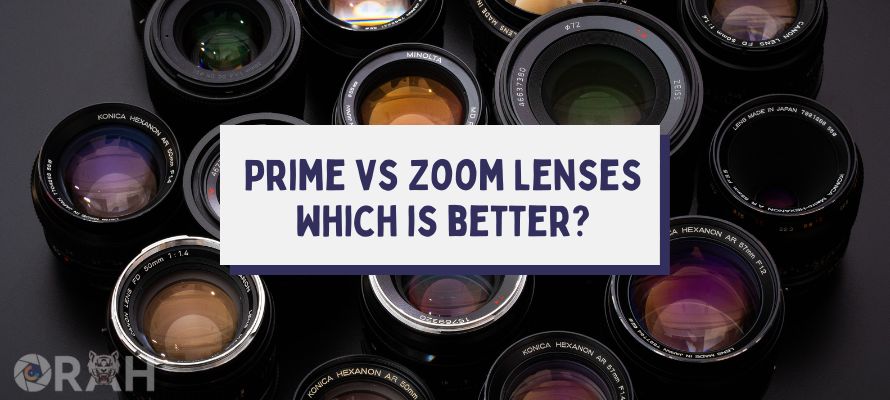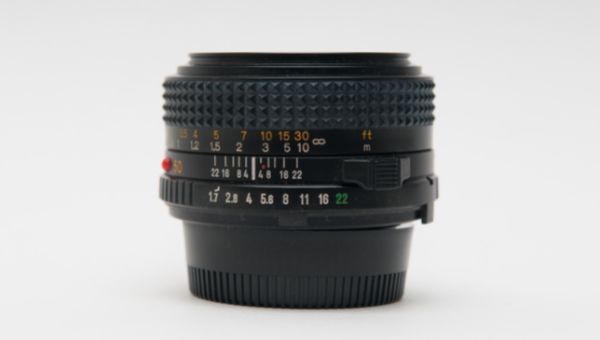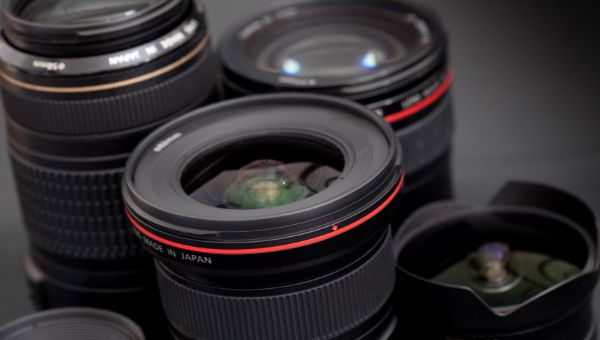
One of the most looming questions that come to the mind of aspiring filmmakers and amateur photographers is whether they should prefer getting themselves a prime lens or a zoom lens.
Lenses are some of the most expensive components you will need when you want to do filmmaking and photography.
There is a debate on what type of lenses are best, and due to the initial purchase cost, people tend to buy one. So, if you are on the verge of deciding on investing in one, then to help you as I am going to list a Prime Vs Zoom Lens debate.
There are pros and cons to both of them so keep on reading so that you can make an educated decision on which one you should invest your hard-earned money.
What Is A Prime Lens?
Prime Lenses are small lenses that are relatively cheaper than zoom lenses; however, they have some benefits. First and Foremost is that Prime Lense are smaller in size owing to their fixed focal width. They can be carried around easily, so you will have a lighter backpack while using prime lenses.

Another benefit of Prime Lens is that they are beginner-friendly because they compel you to move around for your shots and allow you to learn.
Prime lenses are also very sharp; thanks to their wider aperture, you will have a more defined depth of field. Prime lenses are also better for low-light photography due to their aperture size.
There is also a lot less hassle and pre-production editing required in the photos and videos you take with prime lenses as they have a lot less distortion compared to the same aperture zoom lens. Prime lenses are especially great if you do a lot of portrait photography.
One benefit of prime Lens that aspiring filmmakers and photographers especially appreciate is its price. A Prime lens costs a fraction of what a zoom lens costs, making it relatively affordable. A zoom lens has its benefits; however, if you are a beginner, prime lenses are your best bet.
What Is A Zoom Lens?
On the other hand, the zoom lenses are bulky lenses with different focal lengths and give you the versatility to capture things without needing to move.
Zoom lenses are extremely popular with wildlife photographers who use a zoom lens to snipe their subjects without them needing to disturb them to get a photo.

Zoom lenses are extremely versatile and can cover a lot of space and distance without you needing to move a lot. Professional Photographers use Zoom lenses as they have a lot of options available to them.
For example, there are zoom lenses that can cover all ranges like wide-angle and telephoto without you needing to change the Lens, making them extremely practical.
Even though Prime Lens can make you a better photographer by looking around for your shots, A zoom lens, on the other hand, can be mastered in no time. Due to its practicality, Zoom lenses are favored more over prime Lenses.
Zoom lenses are favored in all types of situations. From Wildlife Photographers who want to capture the unique behavior of the animals to wedding photographers who wish to capture some great candid memories, zoom lenses are tried and true in all these situations.
Prime vs Zoom Lens Comparison
Now let us compare Prime Lenses to Zoom lenses. The first comparison will be their price. Prime Lenses are cheaper than Zoom lenses. You can almost buy two prime lenses for one zoom lens.

Secondly, Zoom lenses are incredibly versatile, while prime lenses are not due to their focal lengths. Zoom lenses have different focal lengths, while prime lenses have a fixed focal length. This saves Zoom lens users a lot of leg work.
However, on the other hand, Prime lens users have better low light performance and depth of field than their equivalent zoom lens. Prime Lens is also lightweight and easy to carry around. On the other hand, Zoom Lens is more versatile and can have the equivalent capability of more than one prime Lens.
The Advantages of Prime Lenses
Investing in a Prime Lens can be an excellent investment if you want to hone your filmmaker skills. Apart from that, you should keep some other advantages in mind while deciding whether to invest in a prime lens or a zoom lens.
Size And Weight
One of the most significant advantages of buying a Prime Lens over a zoom lens is its size and weight. Prime Lens has a fixed focal length, making them very small. Their size also makes them easy to carry around. However, you will need to do leg work if you want to get the desired shot of your subject.
Price
Lenses are expensive. This is an irrefutable fact, and one must shell out a pretty penny to get the Lens they want. In this regard, Prime Lens also offers you another benefit: their price.
Due to their size and capability, Prime Lens costs a fraction of what zoom lens cost. Their price alone can make them a desirable option for many aspiring filmmakers.
Wider Aperture
One of the things that Zoom Lens can not win over a prime lens is its wider aperture. If you try investing in a zoom lens with a wider aperture, you will need to spend much money compared to a prime lens with a significantly lower cost.
An expensive zoom lens will have an aperture of f/2.0 when a significantly cheaper prime lens would give you f/1.4. A wider aperture means way better low light performance and bokeh, which will always be a win for me.
Low Light
Due to the wider aperture of a Prime lens, you will also be getting a better low-light performance. A prime lens will give you a brighter picture than a zoom lens at the same time of day without you needing to crank the iso. So magic hour photos will be brighter on a prime lens than on a zoom.
The Zoom Lens Advantages
I may have said way too much in favor of prime Lenses; however, zoom Lenses are no joke, and professional photographers prefer zoom lenses over prime Lenses despite some advantages. Want to know why? Here are some reasons you should get a Zoom Lens over a prime lens.
Image Stabilization
Stabilization is the capability of a camera or a lens to stabilize the resulting image by moving the Lens in response to the tremors a photographer’s hand may make.
In Zoom lens, you have image stabilization which is not functionality available on a prime lens. The Lens will move around on a zoom lens to stabilize itself, giving you the image you wanted to capture.
Versatility
Where do I get started on the Versatility of Zoom Lens? One of the biggest reasons Professional Photographers carry around and invest in these huge Zoom Lenses is that they have many options. They can go from normal focal width to telephoto to a wide-angle all in one Lens.
Wildlife Photographers take great photos of animals in the wild from a great distance without needing to go near the animal. You may need to risk your life with a prime lens to get that same shot.
Ease of Learning
As I mentioned earlier, Prime Lens is beginner-friendly as you do a lot of leg work, which can make you learn the art of photography better than sticking with a zoom lens.
However, once you switch to a zoom lens, you do not need to experiment a lot before you get the hang of it, as zoom lenses are extremely easy to learn and master.
More readings related to this:
- Portrait vs landscape: which is best for photography?
- Vibrance vs saturation in photography
- Mirrorless vs DSLR: the differences
- Softbox vs umbrella
- Soft light vs diffused light
Wrap-Up:
Well, this sums up our debate about Prime vs. Zoom Lens. So, what is my verdict then? Which one is better? The answer to this question is that neither is better than the other. Prime and Zoom lenses have different Pros and Cons, which does not let one get a better hand than the other.
Prime Lens has strong suits, which start from their size and price, making them the go-to Lens for aspiring filmmakers and photographers. Prime Lens gives you a better low light performance which can take the cake from the zoom lens.
On the other hand, the zoom lenses are bigger and more expensive; however, they are the go-to choice for pros worldwide. They are extremely practical and versatile, eliminating the need to carry around a lot of lenses.
A single zoom lens will let you take a wide variety of shots and do it without moving an inch. So, the verdict is primarily up to you on your requirements and budget.
Frequently Asked Questions (FAQs)
#Q1- Are Prime Lenses better than Zoom?
Answer: No Prime lens is better than a zoom lens or the other way around. You need to know what your requirements are and invest accordingly. If you do low light or portrait photography, prime Lenses are the ones for you.
However, if you are into wildlife photography, zoom lenses will be your best bet. If you are a beginner, Prime Lens are your best bet as they will equip you with the skills you need to learn filmmaking due to all the leg work you must put in.
#Q2- When Should you Choose One Over the Other?
Answer: The decision to make which sort of Lens you need to choose depends on your requirements. Prime lenses have a wider aperture, making them great at portraits and with better low light performance.
They are also cheaper and lighter. Zoom lenses, on the other hand, are extremely versatile and give you the capability of many prime Lenses in one.
#Q3- Which should you choose, Prime or Zoom Lenses?
Answer: It would be best if you chose either Prime or Zoom lens, depending on your requirements. If you are someone that has the liberty to change their Lens and likes to move around to get the perfect shot, then prime Lens is your best bet.
However, if you do not have the liberty to change your Lens and want to keep a distance from your subject, you should invest in a zoom lens. Prime Lens is also beginner-friendly; however, Zoom lenses are easier to learn.
#Q4- How many Prime Lenses do you need?
Answer: Now, there are the biggest caveats of prime lenses. Prime Lens have a fixed focal length, so you would need to change them depending on your requirement.
So depending on your requirement, you can buy as many as you want. However, if you feel the need to change Lens a lot, it is better to give up the wider aperture and invest in one zoom lens that will cover all the required focal lengths.
#Q5- What are Prime Lenses best for?
Answer: One of the biggest applications Prime lenses are lauded for is their portraits. Prime lenses crush zoom lenses when it comes to portraits.
Due to their wider apertures, they have a great depth of field, giving you a nice bokeh behind the subject. Apart from that, your magic hour photos will also be better on a prime lens due to their low light performance, eliminating the need to crank up the ISO.
#Q6- Do Pros use Zoom lenses?
Answer: Pros love zoom lenses due to their versatility. They cover a wide range of focal lengths without needing to change lenses.
Wildlife photographers love using zoom lenses as they can get a shot of the animal they want to shoot without disturbing them in nature.
#Q7- Do you need a prime lens if you have a zoom lens?
Answer: If you have splurged on a zoom lens, then there is no need for a prime lens. Suppose you have some money burning a hole in your pocket, then OK.
Get a prime lens for a wider aperture. A prime lens will be considered more of a luxury than a necessity if you have a zoom lens already.
#Q8- Can I use prime Lens for landscape?
Answer: Yes! Prime Lens is fantastic if you want to use them for landscape photography. They have a wider aperture which captures more light giving you a brighter shot, especially at the magic hour.
Their wide-angle capability and sharper image quality make the prime Lens the go-to Lens for landscape photographers.
#Q9- Are Prime Lenses sharper?
Answer: Prime Lenses are sharper than zoom lenses. They have a lot less distortion, and the shots you capture with a Prime Lens at a fixed focal length need fewer post-production adjustments than their zoom lens counterparts.